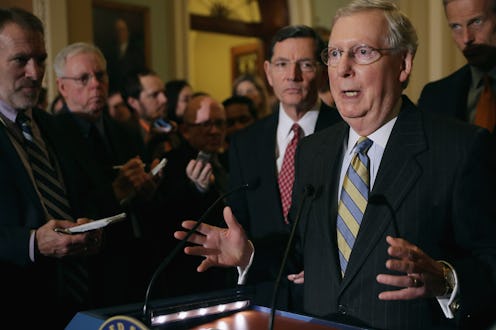News
The AHCA Lacks Majority Support In All 50 States

If the various clashes over healthcare reform at rallies and town halls across the country weren't enough, recent data compiled from the The New York Times also concludes that Americans generally had (and still have) icy reactions to the American Health Care Act (AHCA). Regardless of a state's red, blue, or purple nature, pretty much all of the numbers The Times collected from eight national polls pointed to antipathy over the bill. So, the question remains: Will senators still support the AHCA even if it's unpopular?
Using a model that took various demographic information into account to estimate public opinion, The Times' data indicated that along with obvious negative vibes from blue states, the states that were the most supportive of the legislation aren't even all that supportive.
While Oklahoma (considered "deep-red") was estimated to only have 38 percent of voters approving of the law, they estimated 45 percent opposed (and 17 percent had no opinion). For other states that heavily supported President Donald Trump in the 2016 election, the estimation of support for the bill didn't fare any better and "rarely" passed 35 percent approval. TL;DR: disdain for the bill is bipartisan.
Further, most sitting Republican senators still represent states that have "less than a third" of their constituents supporting the bill. Paired with the fact that an elected official's job security depends on how well they manage to represent the interests of their voters, it's very possible that failing to consider public opinion could be a bad decision — even if you're a red senator in a red state.
While senators have promised that they are making changes to the original House Bill version (the Rose Garden party-inspiring one that was later allegedly called "mean" by the president), The Times noted that the initial responses to modifications to that bill didn't earn the AHCA any more support.
To get a better understanding of what senators could lose if they continue to support a bill that remains so wholly unpopular, The Times pointed to the existing data on how the initial dislike of the Affordable Care Act (ACA) affected sitting Democrats at the time. As those Dems reportedly lost about six percentage points in the infamous 2010 vote, it's possible that Republicans who only held on to their seats by a small margin could be threatened by a repeat of that scenario.
Despite the 2017 trend of holding partisan rank over all else, all signs (and the numbers) obviously point to legislators needing to take a long hard look at the wants and needs of their constituents before falling on their swords for this piece of legislation.